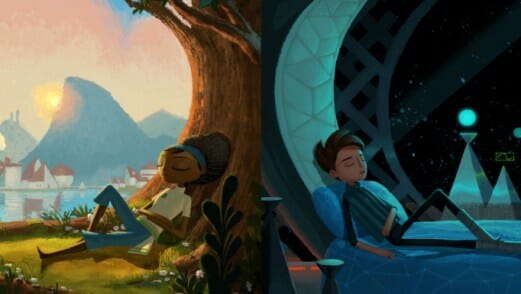Broken Age (PC/Mac)

Almost exactly two years ago, I backed a Kickstarter for a game code-named Double Fine Adventure.
A couple of hours later, I went to get dinner with some friends and a two month-old baby. Like most babies, this baby wasn’t used to anything; what was to us a run-of-the-mill (albeit fun) dinner of pizza and syrupy Italian cocktails seemed to blow the baby away at every turn. What the baby experienced was something different from novelty, because he didn’t have any baseline for normalcy to determine novelty by. He seemed overwhelmed by trying to make sense of everything around him at once, which translated into a contagious, stupefied awe. At one point a John Mayer song came on and it was remarked upon that we were witnessing the baby’s first John Mayer experience. Even that couldn’t bring the baby down.
While the baby, safe in his mother’s arms, was kept occupied observing the combination of pinball and draft beer that so many of us take for granted, a bunch of us kept checking our phones to see if the Double Fine Adventure Kickstarter would break the million dollar mark.
My friends and I were interested in the turnout of the Kickstarter because it meant the arrival of a new point-and-click adventure game by Tim Schafer, and each of us had fond memories of playing his older point-and-click adventure games on family computers when we were younger and more impressionable.
After that night, I didn’t see the baby again until a couple of months ago. During the interim, Double Fine Adventure raised over three million dollars, was renamed Broken Age and was broken into two acts. The baby is still more or less a baby, but two years of life experience have given him the luxury of having preferences. He’s getting a handle on which flavors of ice cream are better than others, what’s unusual enough to merit being impressed and what’s worth ignoring entirely (John Mayer, hopefully). All of his preferences are byproducts of things like the environment his parents have created for him and what’s currently popular, but to a certain extent they’ll probably stay with him for the rest of his life.
The runaway success of Schafer’s Kickstarter, and the near-unanimous excitement surrounding his return to the format that made him famous, probably happened for a bunch of reasons: Schafer is a smart guy with a lot of influential friends and admirers. Back in early 2012, Kickstarter itself still felt like something new; it was just beginning to be seen as a way for creators to break out of the creatively toxic pattern of a publisher-driven business model. Not least among those reasons, though, was an entire generation of fans’ three-million-dollar desire to revisit a mood, atmosphere and play style that was far more prevalent during their youths than it is today. The implication was that They Don’t Make ‘Em Like That Anymore.
Schafer himself has suggested that approaching a big-name studio with a pitch for a point-and-click adventure game would end in him being laughed out of the room. The reasoning behind the laughter, it’s said, is that the current gaming generation (i.e., the vast majority of the game-buying public) lacks reference points for a game as wordy and slow-paced as those in Schafer’s wheelhouse. The word “gamification” has come to signify reminding and reassuring someone at every possible turn that they’re making quantifiable progress, whereas a game like Broken Age feels like a throwback in the way it’s content to offer red herrings, move at a slow pace and throw in neat little touches that are there just for the hell of it. People weaned on the former might find themselves feeling unmoored and bored amongst the latter, where people weaned on the latter might find themselves overwhelmed and annoyed by the former.
Broken Age’s existence is a direct result of generational conflict and our tendency towards preferring what we’re used to. That is also what Broken Age is about, so far.
The first act of Broken Age consists of two separate stories that can be played independently of one another. One stars a girl named Vella (voiced by Masasa Moyo), who has been chosen by her village to participate in a tradition whereby she puts on a fancy dress and gets eaten alive by a giant horrifying Lovecraft monster. It also stars Shay (Elijah Wood), a guy being held on a spaceship by an artificial intelligence that takes the form of a coddling, overbearing set of parents.
Both main characters feel trapped by the routines and risk aversion of the power structures surrounding them and take drastic, potentially ill-advised action in order to find out what else they might be capable of. Given Schafer’s track record with large game publishers, I’d guess that this aspect of Broken Age’s story is pretty important to him.
-

-

-

-

-

-

-

-

-

-

-

-

-

-

-

-

-

-

-

-

-

-

-

-

-

-

-

-

-

-

-

-

-

-

-

-

-

-

-

-









































